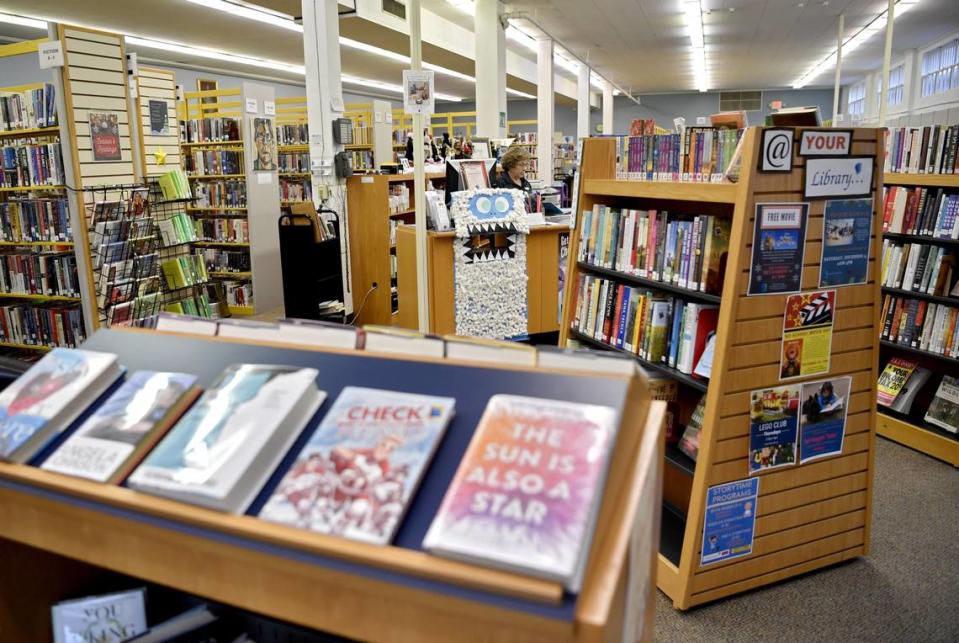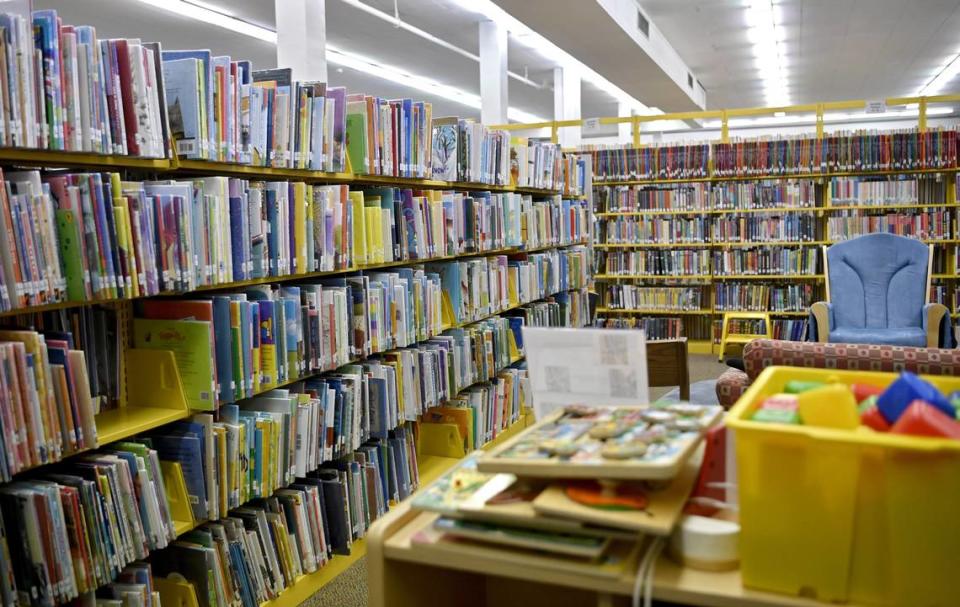Banned books are in the spotlight across the US. What has happened in Centre County?
For months, public comment at State College Area School District board meetings has had a recurring theme: the reading of explicit passages from books found in the State High library, books some community members deem inappropriate for minors in a taxpayer-funded school.
Megan Layng, a candidate for a seat on the SCASD board, has been a vocal proponent of increased transparency when it comes to the library catalog and how books are chosen. During public comment, Layng has questioned the district for allowing books such as “All Boys Aren’t Blue” by George M. Johnson and “Kingdom of Ash” by Sarah J. Mass, which contain sexually explicit passages. “All Boys Aren’t Blue” landed at No. 2 on the list of top 10 national banned books for its LGBTQ+ content and claims of sexually explicit content. Other ranked books include Toni Morrison’s “The Bluest Eye,” Mass’ “A Court of Mist and Fury” and John Green’s “Looking for Alaska.”
Layng isn’t the only one voicing concerns. At least four other parents have spoken out about similar concerns — although Layng is the most outspoken. At a July 10 meeting, she read a section of “All Boys Aren’t Blue” and part of federal law about the transfer of obscenity to minors. Under the law, the material must be determined obscene and lack serious literary, artistic, political or scientific value.
“Most other constituents don’t even know this level of obscenity actually exists in the library,” Layng said during public comment.
Banned books are in the spotlight across the country for Banned Books Week, Oct. 1-7, which highlights the most challenged titles across the country. While there have been no book bans in Centre County schools, some have concerns that a growing national trend is creeping closer to home as local school districts field questions about library catalogs and material accessible by students.

Local and statewide ban attempts
Libraries across the country are experiencing an unprecedented spike in book challenges and attempts to restrict access. The American Library Association Office for Intellectual Freedom reported 1,269 titles challenged in 2022, nearly double the 729 challenged in 2021. Last year marked the highest number of attempted book bans since the ALA started collecting data, with most challenges targeting books written by people of color or members of the LGBTQ+ community. In 2022, Pennsylvania saw 56 attempts to restrict books and 302 title challenges in those attempts — second only to Texas.
One of those attempts came in the Penns Valley Area School District, and was ultimately unsuccessful. In August 2022, after months of discussion, the Penns Valley Area School Board voted on whether to continue allowing an AP Literature course to use “The Glass Castle” by Jeannette Walls as an optional text. Parents and community members argued the memoir had vulgar language and discussions of abuse and alcoholism that were not age-appropriate for students. Following the discussion, the board voted 5-1 to keep the book as an optional part of the district’s curriculum. Board member Lisa Bierlein was the only dissenting vote from the board after her motion to remove the books from the curriculum was not seconded.
“The one thing I will not do? I will not ban a book,” board president Domer Smetlzer said during the August 2022 meeting.

Local library staff prepares for challenges
Preliminary data from January to August 2023 shows a 20% increase from 2022 in attempts across the U.S. to restrict access, with 695 attempts recorded during the eight-month period.
The majority of challenges take place in schools or public libraries, 51% and 48% respectively.
Denise Sticha, director of Centre County Library and Historical Museum, said she’s only had two instances since 2018 of patrons voicing concern, but no one has gone through the process to get a title reviewed. Still, the increasing number of national challenges has library staff on edge. Sticha said her staff has undergone training on how to respond to possible conversations or situations around the library catalog.
Sticha sees the increase in challenges as a result of national groups that support restricting access to library materials they deem inappropriate. These advocacy groups, including Moms for Liberty, No Left Turn in Education, and MassResistance, are behind at least half of the book bans nationally, according to PEN America.
“There are other groups of people who buy into that agenda,” Sticha said. “And then they take that agenda local, without really understanding the local community.”
Book ban or parental choice?
In the year since the unsuccessful attempt to remove “The Glass Castle,” Penns Valley has not faced other challenges about titles in the curriculum or library catalog, superintendent Brian Griffith said. But other districts in central Pennsylvania have grappled with clearing titles to use in high school curriculum. In May, the Glendale District School Board in Cambria County denied a motion to purchase several books for the 12th grade English class, including “The Lovely Bones,” “Scythe,” “Turtles All the Way Down,” “Percy Jackson’s Greek Heroes” and “All the Light We Cannot See,” according to the Progress.
While State College Area School District has not seen formal challenges or attempts to restrict access, discussions about the library catalog have been prevalent during public comment since June. Despite her criticisms of the books, Layng dismisses the title of “book banner,” calling it an ad hominem attack in a blog post on her candidacy website.
“So let’s be clear: there is no talk or advocacy of ‘book banning,’” Layng wrote. “There *is* a great deal of discussion about what kind of content is appropriate for taxpayer dollars to fund, and what is appropriate for our public schools.”
Layng declined to an interview with the CDT for this article unless given permission to review it before publication.
SCASD’s policy on library material selection states that although the district takes care to select reading materials that accommodate a wide range of interests, abilities and maturity levels, the final decision of what students read rests on the student’s parents or guardians alone.
“The wishes of one child’s parents to restrict his/her reading or viewing of a particular item should not, however, limit the rights of others to read or view the same material,” the policy states.
Parents and community members are still free to file a request for reconsideration of materials they believe should not be included. In an email to the CDT, superintendent Curtis Johnson said he supports the judgment of the district’s library personnel.
“In keeping with our belief in inclusion, we strive for a diverse range of perspectives and subjects in our libraries so that all students can find books and materials that resonate with them,” Johnson wrote. “Our librarians carefully select titles on that basis, and we have confidence in their professional judgment.”
Local public libraries also have ways for patrons to request a title be added to the catalog or reconsidered, allowing community members’ input on the titles offered. But for some, removing access to titles that some parents may deem obscene is a slippery slope to censorship.
“When I hear people say ‘I’m not about censorship, I’m not about book banning, but I don’t want that book in my kid’s library,’ explain to me how you justify that action and not say that that’s censorship,” Sticha said. “... I think it’s a step down the slope. I always think, what is the end result? Where does it stop? Who gets to make those calls?”
SCASD board member Peter Buck, a vocal opponent of attempts to remove or restrict access to books, said he categorically believes that attempts to limit access to titles that have been deemed appropriate by educators and librarians constitutes book banning.
“You can call it whatever you want,” Buck said. “But it’s a book ban, because you’re removing material from a library, deemed to be of educational value to children in the age group that library serves and calling it anything else is Orwellian.”
On both sides, the debate seems to boil down to one question: who gets to decide what goes into publicly funded library catalogs? Is it parents, administrators, community members, librarians? The answer is not so simple.
Sticha said the aim of a public library is to be a “window and mirror” to the community it serves, reflecting the wants and needs of all patrons.
“The idea is that your collection should be a mirror of the community that you live in. It should reflect the people that live in your community that come into your library and that reflection of course can be very diverse ...” Sticha said. “So your collection is partly a reflection of the community, but it’s also a window into the world outside of your community. And that’s a very important element as well, particularly for children, to be able to see what the world is like outside of their community.”

